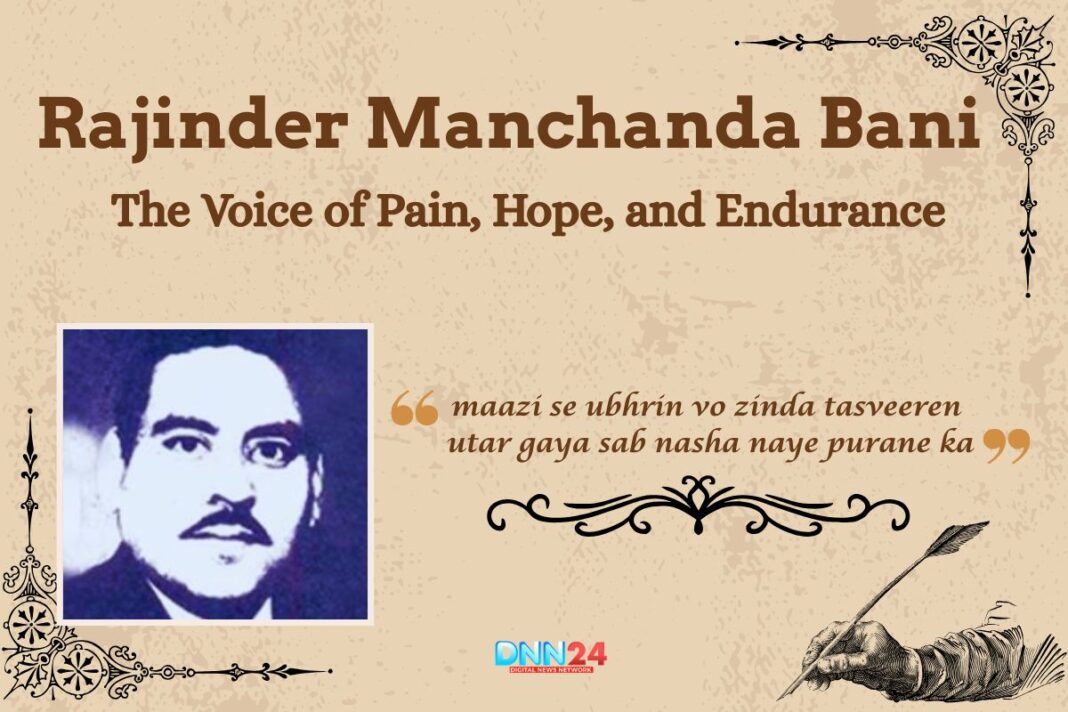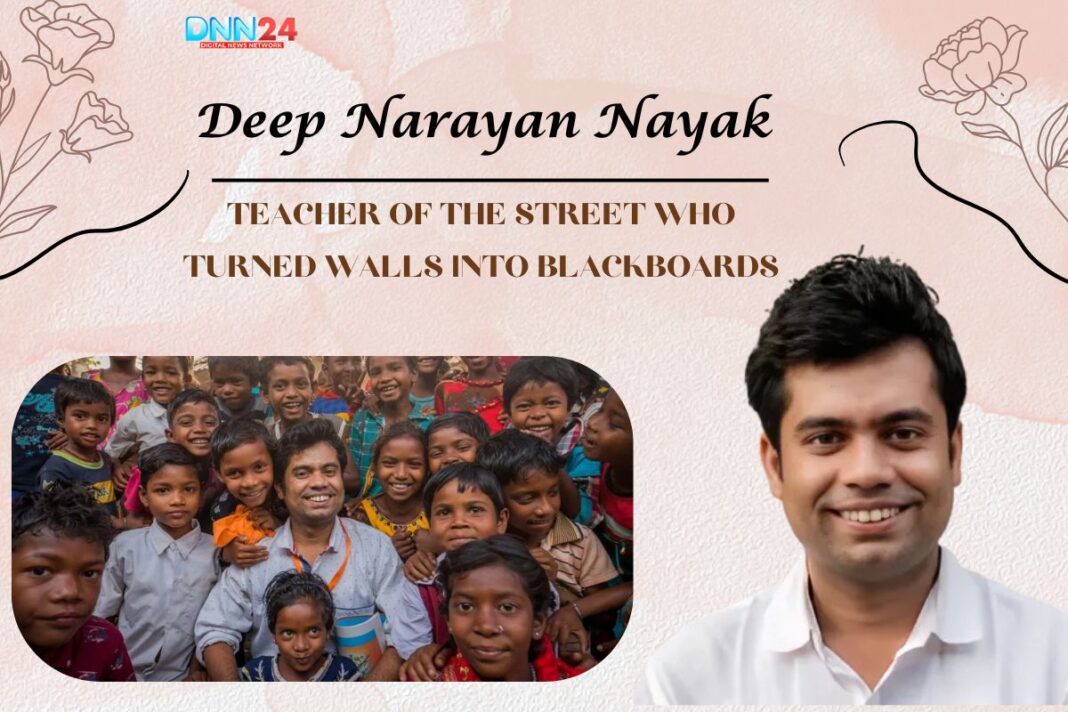Rajinder Manchanda Bani was not just a poet but also a symbol of quiet endurance. Born in Multan in 1932, and later displaced by Partition, he became one of the most original voices in modern Urdu poetry. His life carried scars of migration, economic struggle, and frail health, yet his pen never stopped. Bani showed how poetry can bloom even in the hardest soil, turning personal grief into words that touched thousands.
vo Tutte hue rishteon ka husn-e-aakhir tha
Rajinder Manchanda Bani
ki chup si lag gai donon ko baat karte hue
His verses were soft but powerful, shaped not by grandeur but by honesty and emotional depth. Unlike many of his contemporaries who wrote in high romantic tones, Bani’s poetry whispered with truth, pain, and courage. His journey remains essential for literature and anyone who wishes to understand how resilience and creativity can turn suffering into beauty.
ai dost main khamosh kisi dar se nahin tha
Rajinder Manchanda Bani
qail hi teri baat ka andar se nahin tha
Early Life: Childhood Shadows and Unexpected Light
Rajinder Manchanda Bani’s early life was full of disruptions. Partition uprooted his family from Multan and forced them to start over in Delhi. The shock of leaving behind a birthplace, familiar people, and childhood memories left marks on his mind. At the same time, poor health from an early age added another layer of isolation.
us se pyaas kahan bujhti hai
Rajinder Manchanda Bani
musladhar baras meri jaan
While other children ran through the streets, he often remained indoors, weak in body but strong in imagination. This loneliness did not defeat him. Instead, it made him an observer. He noticed the colours of life around him, the smiles of neighbours, the cries of low-income people, and the restless energy of a newly divided India.
vo ek aks ki pal bhar nazar mein thehra tha
Rajinder Manchanda Bani
tamam umr ka ab silsila hai mere liye
Teachers remembered him as a quiet boy who often missed school due to illness but always returned with notebooks filled with reflections and half-formed verses. Bani learned to create from silence; from solitude, he drew the strength to endure.
koi bhi ghar mein samajhta na tha mere dukh sukh
Rajinder Manchanda Bani
ek ajnabi ki tarah main khud apne ghar mein tha
Hard Times and Hidden Battles: Partition, Poverty, and Humility
After the migration, Bani’s family faced severe hardships. They began life in Delhi with almost nothing. Struggling to support himself, Bani decided to study Economics and completed his Master’s degree from Punjab University. It was a practical choice, showing his sense of responsibility towards his family.
‘bani’ zara sambhal ke mohabbat ka mod kaat
Rajinder Manchanda Bani
ik haadsa bhi taak mein hoga yahin kahin
Yet economics never took away his passion for poetry. He worked as a schoolteacher, teaching students daily while writing ghazals late at night. Many stories recall his humility during this period. Once, a student found one of his ghazals inside a class ledger. Instead of embarrassment, Bani smiled and said, “Words can feed a soul even when empty stomachs.”
dhalegi shaam jahan kuch nazar na aayega
Rajinder Manchanda Bani
phir is ke baad bahut yaad ghar ki aayegi
This combination of duty and dream became the mark of his life. Despite his financial struggles, he never abandoned his art. His personal battles against poverty, displacement, and poor health only deepened the voice of his poetry, giving it a sincerity that readers felt immediately.
zara chhua tha ki bas ped aa gira mujh par
Rajinder Manchanda Bani
kahan khabar thi ki andar se khokhla hai bahut
Poetic Dawn: Freshness Amid Uncertainty
When Bani entered Delhi’s literary circle, he surprised everyone with his unique style. His poetry was not loud or dramatic but soft, subtle, and deeply introspective. He avoided clichés and brought new images into ghazals, making them relatable to the modern reader.
udaas shaam ki yaadon bhari sulagti hawa
Rajinder Manchanda Bani
humein phir aaj purane dayaar le aayi
His collections, Harf-e Moetbar (1972), Hisab-e Rang (1976), and the posthumous Shafaq-e-Shajjar, stand out for their freshness.Bani wrote about displacement, loneliness, and the quiet battles of everyday life. His verses reflected the pain of living as a stranger even in one’s home.
aaj kya laut te lamhaat mayassar aaye
Rajinder Manchanda Bani
yaad tum apni inayat se badh kar aaye
For instance, one of his lines expressed alienation: “No one in my home understood my joys or sorrows; I lived like a stranger in my own home.” Such words captured personal struggle and a collective loss after Partition. His voice carried depth without being heavy, hope without ignoring sorrow, and individuality without rejecting tradition.
din ko daftar mein akela shab bhare ghar mein akela
Rajinder Manchanda Bani
main ki aks-e-muntashir ek ek manzar mein akela
Unheard Stories: Kindness, Mentorship, and Life’s Poetry
Beyond his poetry, Bani was known for his kindness and humility. He never sought fame or luxury. Friends recalled how he often wrote verses on scraps of paper, old bills, ration cards, or hospital slips. He believed that art required no comfort, only honesty.
is qadar khaali hua baitha hoon apni zaat mein
Rajinder Manchanda Bani
koi jhonka aayega jaane kidhar le jaayega
During a hospital stay, even while suffering, he continued to write, telling visitors, “Even in pain, hope is my ink.” Many young poets in Delhi remembered how Bani encouraged them, often giving up his time in mushairas so that a newcomer could perform. He lived modestly, rarely posing for photographs, never chasing recognition.
ajeeb tajurba tha bheed se guzarne ka
Rajinder Manchanda Bani
use bahana mila mujh se baat karne ka
His life exemplifies how a true poet values words over applause. Students who studied under him as a teacher remembered how he taught them to see beauty even in ordinary afternoons, urging them to find meaning in small details. These stories warm his image and reveal the gentle humanity behind his lines.
jaane vo kaun tha aur kis ko sada deta tha
Rajinder Manchanda Bani
us se bichhda hai koi itna pata deta tha
Legacy and Lasting Light: Inspiration Beyond Generations
Rajinder Manchanda Bani passed away in 1981 at just 49 years of age. Though his life was short, his poetry continues to resonate. His works bridge the distance between Urdu and Hindi, carrying the essence of both traditions. Unlike poets who chased grandeur, Bani’s power lay in his simplicity.
main chup khada tha taalluq mein ikhtisar jo tha
Rajinder Manchanda Bani
usi ne baat banayi vo hoshiyar jo tha
He spoke of loneliness, displacement, and fragile health, yet he always left a trace of hope. His ghazals are still recited in mushairas and quoted by readers who find an echo of their own struggles in his words. By living humbly, balancing duty with passion, and creating art in the face of hardship, Bani gave future generations a model of courage.
tu koi gham hai to dil mein jagah bana apni
Rajinder Manchanda Bani
tu ik sada hai to ehsaas ki kaman se nikal
His story shows that greatness does not always arrive with fanfare. Sometimes, it blooms quietly, like a flower in a hidden corner. Today, his legacy shines not just as literature but as a lesson in humanity, resilience, and compassion.
mere banaye hue but mein rooh phoonk de ab
Rajinder Manchanda Bani
na ek umr ki mehnat meri akarat kar
An Ordinary Life, An Extraordinary Message
Rajinder Manchanda Bani’s story is not just about a poet, it is about a man who turned his wounds into words and his struggles into strength. He was uprooted by history, tested by poverty, and weakened by illness, yet he never allowed these burdens to silence his pen. Instead, he transformed them into verses that continue to comfort and inspire.
mohabbaten na rahin us ke dil mein mere liye
Rajinder Manchanda Bani
magar vo milta tha hans kar ki vazdar jo tha
His life reminds us that poetry is not born in perfect conditions but in the cracks of life where resilience grows. Bani showed that art can survive even in the harshest times, offering shelter and wings.
na jaane kal hon kahan saath ab hawa ke hain
Rajinder Manchanda Bani
ki hum parinde maqamaat-e-gum-shuda ke hain
In his quiet way, he became a beacon of hope, teaching us that extraordinary beauty often hides in ordinary lives. His legacy is a reminder that even the stillest voices can echo across generations, carrying messages of courage, kindness, and human dignity.
Also Read: India Gate: A Timeless Symbol of Valour and Memory
You can connect with DNN24 on Facebook, Twitter, and Instagram and subscribe to our YouTube channel.



